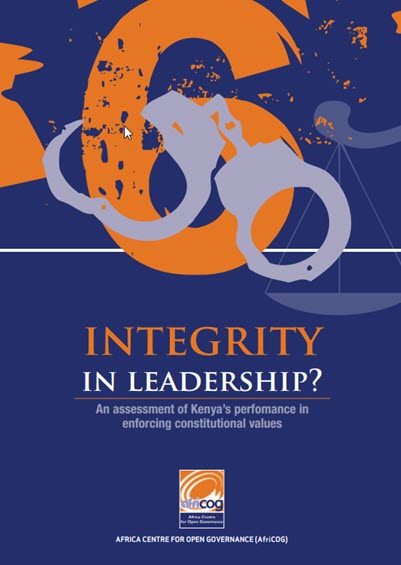The struggle for integrity has formed a major part of Kenya’s recent governance history. Over the decades, the Kenyan public has made its desire for a change in the quality and ethical standards of its leaders clear. Again and again they have cited corruption in leaders as a major national problem which must be addressed if Kenya is to progress.
Chapter Six of the Constitution on Integrity and Leadership is regarded as a consolidation of the efforts that went into that struggle. The Constituition creates the category of states officers and makes special requirements of them to embody the spirit and values of the new Constitution and conduct themselves with integrity. It also creates an Ethics and Anti- Corruption Commission to enforce its provisions and mandates the passage of legislation on leadership and integrity. Accordingly, the implementation of this critical chapter in the Constitution is an important measure of the success that has been met in arriving at correct solutions to the country’s governance problems.
This paper reviews interventions and responses by the responsible organs of the Kenyan state, the Executive, the National Assembly, and the Judiciary in the enforcement of the new integrity regime imposed by Chapter Six. A number of recommendations are provided, with practical suggestions on how challenges can be confronted and improvements can be made towards the goal of achieving the public integrity envisaged in the Constitution.
This paper traces the history of attempts to enforce the leadership and integrity standards of the Constitution and the significant setbacks encountered along the way. This is a history often marked by lack of seriousness, failure of courage and ill intent, particularly in those who bear the greatest responsibility for implementing the Constitution. However, these negative aspects are juxtaposed with the courage and commitment of those who continue to fight for transformation of the conduct and governance of Kenya’s public life. This report complements the contribution that AfriCOG seeks to make to public debate on key governance issues in Kenya, and is an important addition to the body of knowledge since it systematically assesses the country’s experiences regarding the implementation of Chapter Six.
AfriCOG dedicates this report to those who struggle to achieve an end to the misrule and corruption that plague this country so that Kenya can finally achieve its true potential.
